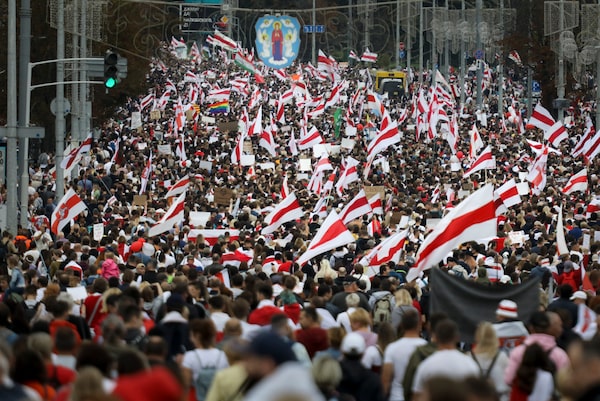
Protesters with old Belarusian national flags march during an opposition supporters rally in Minsk, Belarus, Sunday, Sept. 6, 2020. Sunday's demonstration marked the beginning of the fifth week of daily protests calling for Belarusian President Alexander Lukashenko's resignation in the wake of allegedly manipulated elections.The Associated Press
The European Union aims to impose economic sanctions on 31 senior Belarus officials including the country’s interior minister by mid-September, three EU diplomats said, in response to an Aug. 9 election that the West says was rigged.
Almost a month into mass demonstrations against the outcome of the contest, in which President Alexander Lukashenko claimed victory to prolong his 26-year-old rule, the EU aims to punish the government crackdown and support calls for fresh elections.
“We initially agreed on 14 names but many states felt that was not sufficient. We have now reached consensus on another 17,” one EU diplomat said. “These are senior officials responsible for the election, for violence and for the crackdown.”
EU foreign ministers gave their broad political approval for the sanctions - EU travel bans and asset freezes - at a meeting in Berlin late last month but did not decide who to target.
As repression continued against the opposition on Monday, the European Commission said EU sanctions would be imposed very soon, but did not give details.
“There is the political will and determination to have (sanctions) concluded as soon as possible,” a spokesman for the EU executive told a news briefing. “It’s not a question of whether, only when.”
Greece and Cyprus, which are pushing for separate sanctions on Turkey in a dispute in the Eastern Mediterranean, still need to give their support to the Belarus blacklist.
All 27 EU countries must agree on such measures and Athens and Nicosia could use their support for the Belarus blacklist to obtain tough measures on Turkey, the diplomats said.
LUKASHENKO SPARED, FOR NOW
Names could still be added or taken off the list, but the diplomats said formal agreement is likely to come on Sept. 21, when EU foreign ministers hold their next scheduled meeting. The sanctions coming into effect on Sept. 22.
Lithuania, Latvia and Estonia imposed their own sanctions on Belarus officials in late August. EU diplomats declined to say how closely the Baltic and the EU lists are, for fear of alerting those in question to move assets out of banks.
Interior Minister Yuri Karaev and his deputy are expected to be on the EU list, along with senior election commission, security and justice officials and ministers.
Unlike the Baltic lists, Lukashenko will not be sanctioned. Germany, who holds the six-month presidency of the EU, wants more time for dialog and to leave open the possibility of adding the president’s name at a later stage.
The EU, which has an arms embargo on Belarus, in 2015 eased economic sanctions on Belarus that were first imposed in 2004, seeking better relations with Lukashenko, but now hopes to move quickly to reintroduce so-called restrictive measures.
The EU has been cautious about moving too quickly on punishing officials, wary of an intervention from Russia.
Belarus is the ally closest to Russia of all former Soviet republics, and Lukashenko’s fate lies in the hands of the Kremlin, which must decide whether to stick with him as his authority has ebbed. Lukashenko has threatened to retaliate with reciprocal measures should any EU sanctions be imposed against Belarus.
Our Morning Update and Evening Update newsletters are written by Globe editors, giving you a concise summary of the day’s most important headlines. Sign up today.
This content appears as provided to The Globe by the originating wire service. It has not been edited by Globe staff.